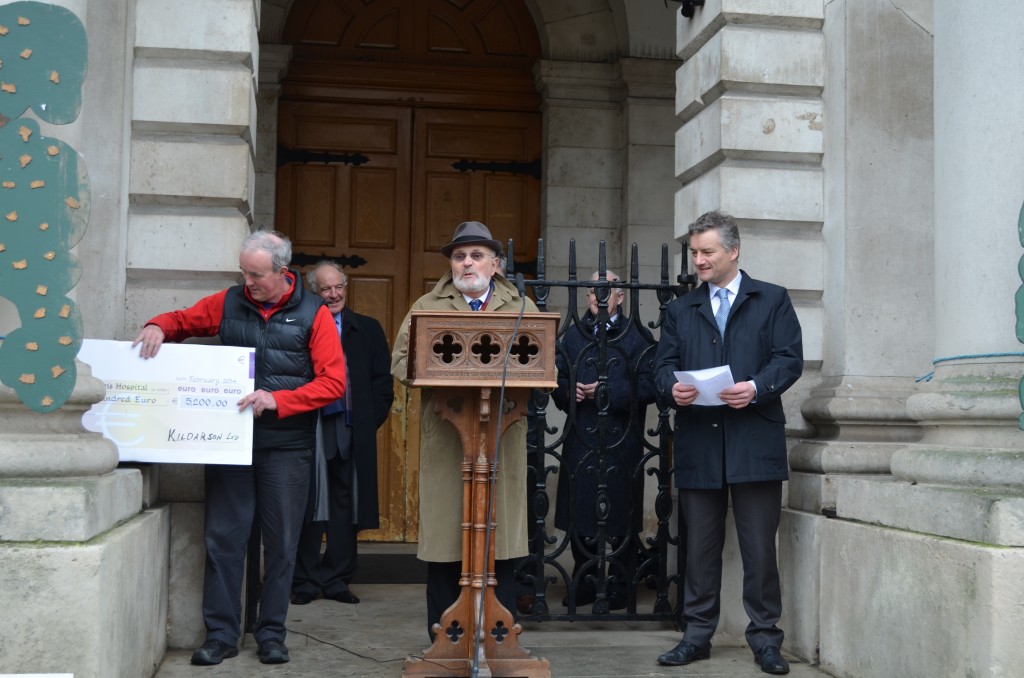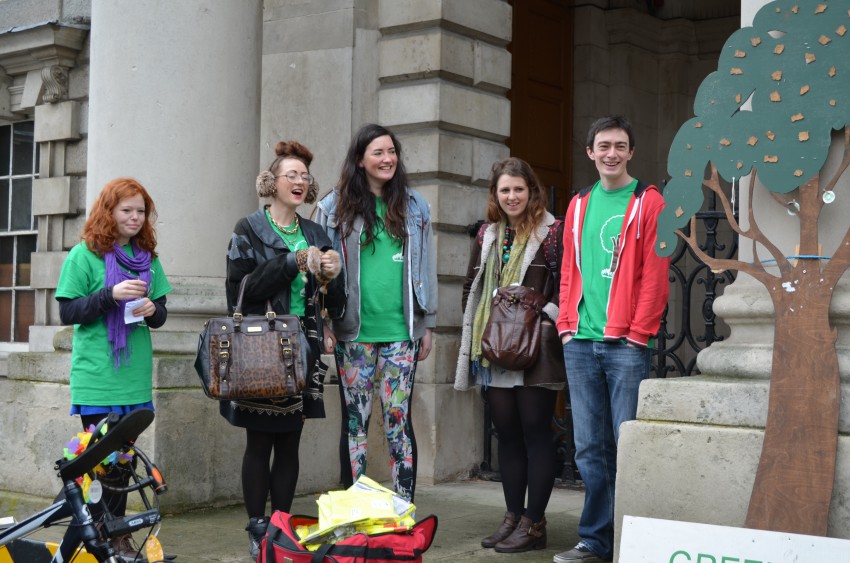Leanna Byrne | Editor
If you climb two flights of stairs and go up a worn iron winding staircase at the top of the Museum Building, you will find the Civil Engineering Library where the Green Campus Committee (GCC) meet. Meetings are infrequent, but adopt the same formalities as any other college committee. Yet the most interesting part of the GCC are its members; all hailing from different strands of the college community, with varying different skills and interests, but collectively dedicated to the promotion of green issues and the protection of our environment.
The GCC, formally known as the College Recycling and Environment Committee, describe themselves as a “forum for discussion” of general environmental issues in Trinity. The committee was established by the late Simon Perry and has been in existence for almost two decades with recorded minutes on file since 1993. Since then, the GCC have initiated many programmes involving students, academic staff, services staff and contractors to make Trinity ‘green’.
The most admirable thing about the members of the GCC is that each committee member attends on a voluntary basis. The committee itself is not formally recognised by the college, which makes taking on an issue that people find easier to overlook all the more difficult.
Last April, Trinity College joined an elite number of colleges in the world by achieving the Green Flag status. The flag was awarded by An Taisce, the National Trust for Ireland, and recognises that the campus reached a medium standard in environmental practices and protection. For many of the members of the GCC, this international award was the result of many years of hard work to make the campus better and more sustainable. What’s more, Trinity College is the only university in a capital city to have been awarded the Green Flag.
“For the GCC, the Green Flag is only a stepping stone in their “long slog” towards environmental sustainability and awareness”
For the GCC, the Green Flag is only a stepping stone in their “long slog” towards environmental sustainability and awareness. With a Green Campus we are expected to meet a certain criteria, which has proven to be challenging so far. Trinity continues to consume massive amounts of energy, with a net cost of €7.3 being spent on energy and utility costs in the last financial year. From 2010 to the end of 2013, the unit cost of electricity has risen substantially by over 50% and, overall, college consumes over 38,000,000 units of electricity each year. That is the equivalent of over 7,000 times the annual electricity consumption of an average private house. Our unit cost of water has also risen consistently over the last 10 years by 4% to 5% per year due to the rising cost of drinking water.
As college is expanding and refurbishing, it has made an effort in water main upgrades and reducing energy consumption. The newly refurbished New Square east residences will be using rainwater harvesting systems to service WC flushing. Trinity’s current contracts for electricity supplies provide for 50% of all electrical power to come from renewable sources such as wind generation. In fact, the total annual electricity consumption for the Biomedical Sciences Institute is generated on site from a natural gas powered Trigeneration plant. This avoids transmission and distribution losses in importing the power from the national grid.

Senator David Norris speaking at the launch of Green Week 2014. Photo by Leanna Byrne for The University Times.
Despite all the advancements made, recycling continues to be a major grievance for the GCC. To keep our Green Flag, recycling percentages need to be up at 30% – 40%, whereas Trinity struggle to make it over 15%.
“Getting up to a seventy or seventy-five percentage rate of recycling is entirely achievable,” said Grounds and Gardens Supervisor, David Hackett. “There’s a lack of care there which leads to contamination.”
Even though we have procured new bins to separate our waste into general waste and recyclables, little change seems to have come to the culture of what we do with our waste. Each day recyclables are finding their way into general waste bins and non-recyclables are contaminating recycling bins. Hackett pointed out that this was costing the college money as we process well over 1,000 tonnes of waste per week. At the cost of €55 per tonne, the college is paying for this out of their central funds while they are making significant cuts to services. Surely paying more attention to recycling would pay-off in the long run?
The fact is that at the heart of recycling and green issues is the individual. For recycling to increase the proliferation of information only goes so far if we still consider waste to be somebody else’s problem. Chair of the GCC, Prof. Ronnie Russell, often finds it amusing that his office overlooks the Green Flag and the Pav, as within twenty metres of the Green Flag students frequently litter the cricket pitch with cans and plastic cups.
“We shouldn’t have to make people learn about this, it should be so well advertised that you don’t have to think about it”
The Environmental and Ethical Trading Officer for the Students’ Union, Julie Trench, does not believe that students ‘simply don’t care’, but argued that it should be easier to care about these issues.
“It shouldn’t be a big task for somebody to dispose their waste. We shouldn’t have to make people learn about this, it should be so well advertised that you don’t have to think about it.”
Head of the TCD Environmental Society, Maya Gryesten Fields, agreed, saying that “it’s easy to throw around these big terms like environmental sustainability, but nobody knows what that is”. She believes that sometimes the GCC can be out of touch because they think that the students are going to go the extra mile without making it as easy as possible.
However, Prof. Russell is under no illusion that students are to blame for poor recycling percentages. “How could they be if they are not being reminded about it every single day? Students are focused on trying to get through their course, they have little time to consider anything else.”
Although he admitted that seeing students and staff leaving lights switched on or not bothering to recycle is “disappointing to see”, Russell believes that with no environmental management system or even an Environmental Officer there is no structure to instill a ‘green’ culture.
“College management are running on a business model and to run a place that is the size of a small township you need to invest in a quality system,” said Russell.
“It is evident that engagement needs to come from the top down with more engagement from the college board rather than a subpopulation of interested people”
For Russell, it is evident that engagement needs to come from the top down with more engagement from the college board rather than a subpopulation of interested people. “There’s a couple of lines about it [environmental issues] at the end of the annual report, but overall there’s too much lip service. When we talk about our situation with other developing universities they are generally surprised that there is no formal structure in place.”
As 2016 approaches, Trinity will be under review as to whether or not we can keep our Green Flag that the GCC have fought hard for. The biggest challenge is one that environmental issues always face: taking responsibility for something that will never have immediate short-term effects. While saving money is an argument for us to start recycling, cutting down on energy and lessening water consumption to do that is to make an initial investment in infrastructure and signage to do so. You need to spend money to save it. Furthermore, people need to care.
It is difficult to point the finger at either the students, the staff or the administration when so much rests on each and every single person to do their part. But, with our Green Flag on the line, the least we could do is think before we forget to turn the light switch off again.







